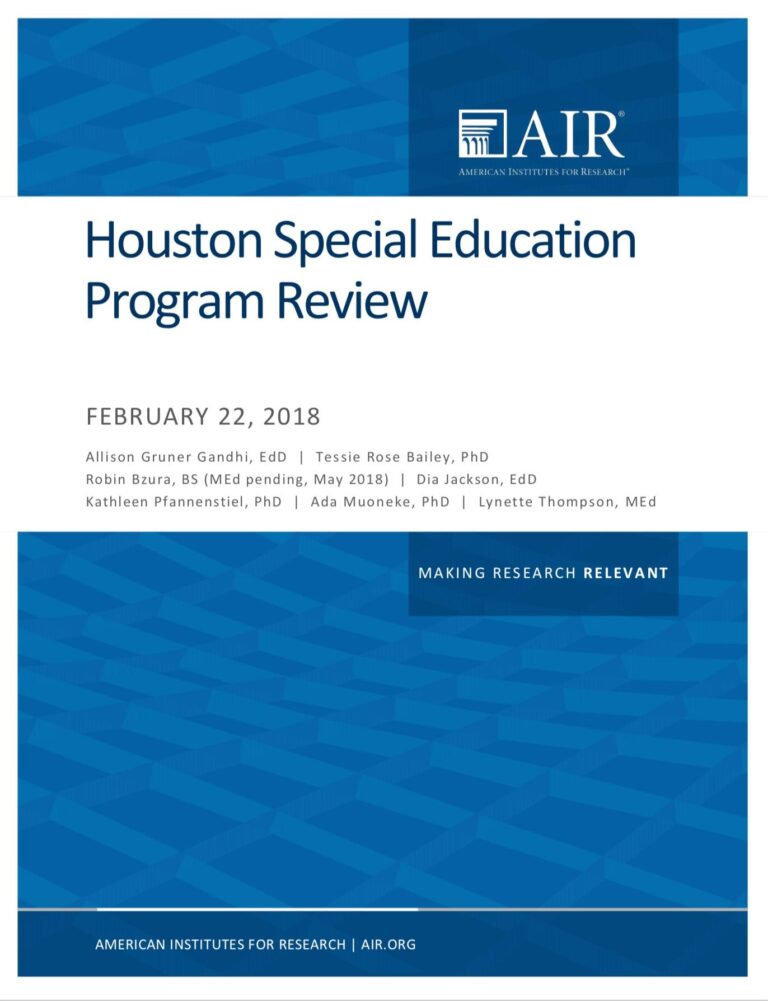Houston ISD’s Special Education: Unveiling Challenges and Emerging Improvements
Comprehensive Audits Expose Persistent Issues in HISD’s Special Education Services
Recent internal evaluations of Houston Independent School District’s (HISD) special education programs have brought to light a range of entrenched operational difficulties that have compromised the quality and timeliness of services for students with disabilities. Critical problems identified include prolonged delays in the development of Individualized Education Programs (IEPs), inconsistent monitoring of student progress, and inadequate training for staff on compliance with legal mandates. These deficiencies have resulted in a backlog of unmet educational needs, raising serious concerns about fairness and accountability within the district.
Nonetheless, the audits also document promising initiatives aimed at remedying these shortcomings. Notable efforts underway include:
- Adoption of centralized data management platforms to enhance tracking of student outcomes and facilitate better communication between educators and families.
- Expanded professional development opportunities specifically designed to keep special education personnel current with evolving federal and state regulations.
- Formation of specialized task forces focused on accelerating IEP completion and closing service delivery gaps.
Below is a comparative overview of key performance indicators before and after the implementation of these corrective actions:
| Performance Metric | Before Audit | After Initiatives |
|---|---|---|
| Average Time to Complete IEP | 45 days | 28 days |
| IEP Compliance Rate | 72% | 89% |
| Staff Training Completion Rate | 58% | 85% |
Detailed Findings Highlight Compliance Shortfalls and Service Delivery Gaps
The audit findings reveal systemic challenges in HISD’s special education framework, including significant delays in scheduling and conducting IEP meetings, inconsistent adherence to federal guidelines, and a shortage of adequately certified staff to meet the diverse needs of students. These issues have led to missed educational opportunities and diminished trust among families relying on the district’s support services.
Despite these obstacles, the reports note early signs of improvement driven by enhanced staff training programs and the rollout of new monitoring technologies that improve documentation accuracy and reduce delays. The table below summarizes key compliance metrics tracked from 2023 through the first quarter of 2024:
| Compliance Category | 2023 Results | Q1 2024 Progress |
|---|---|---|
| Timeliness of IEP Meetings | 68% | 78% |
| Accuracy of Documentation | 70% | 82% |
| Certification Rate of Staff | 60% | 72% |
Experts recommend prioritizing the following strategies moving forward:
- Implementing transparent, real-time progress tracking systems
- Intensifying recruitment efforts to attract qualified special education professionals
- Fostering stronger partnerships between families and district leadership
Encouraging Developments Amid Persistent Accountability Challenges
While HISD’s special education programs continue to face significant hurdles, recent audits reveal encouraging signs of progress. Persistent issues such as inconsistent service delivery and communication breakdowns remain, but targeted interventions across several campuses are beginning to yield measurable improvements. These include more comprehensive staff training, stricter oversight of IEP compliance, and increased family engagement efforts. Advocates cautiously view these steps as essential foundations for restoring confidence and accountability after years of systemic difficulties.
Noteworthy indicators of advancement include:
- Creation of a district-wide special education task force to oversee reforms
- Deployment of enhanced data tracking tools to ensure precise service reporting
- Expanded professional development focused on legal compliance and instructional best practices
- Introduction of quarterly public reports detailing progress metrics
| Metric | Previous Audit | Current Audit | Change |
|---|---|---|---|
| IEP Compliance Rate | 72% | 85% | +13% |
| Parental Satisfaction | 45% | 59% | +14% |
| Staff Training Completion | 60% | 88% | +28% |
Strategic Recommendations: Strengthening Oversight and Tailored Support
To effectively tackle the identified weaknesses, the audits propose instituting a robust governance structure that enhances administrative oversight of special education services. This includes establishing dedicated review committees responsible for conducting quarterly evaluations of program performance and compliance adherence. Additionally, expanding staff training initiatives and implementing transparent reporting systems are critical to fostering accountability and ensuring consistent compliance with federal and state mandates.
Beyond oversight, the reports emphasize the importance of targeted support programs designed to assist students and families most affected by systemic gaps. Recommended interventions include:
- Personalized mentorship initiatives aimed at improving student engagement and academic outcomes.
- Broadened counseling services to address emotional and social challenges faced by students.
- Resource distribution models prioritizing schools with the highest special education demands.
| Initiative | Goal | Anticipated Impact |
|---|---|---|
| Quarterly Review Committees | Monitor compliance and quality assurance | Greater transparency and prompt resolution of issues |
| Mentorship Programs | Enhance student participation | Elevated academic achievement |
| Expanded Counseling Services | Support emotional well-being | Improved behavioral and social outcomes |
| Targeted Resource Allocation | Focus on high-need schools | More equitable distribution of support |
Conclusion: Navigating Complexities Toward Equitable Special Education
As Houston Independent School District continues to confront the challenges outlined in recent special education audits, the journey toward comprehensive reform remains intricate yet hopeful. While the reports underscore deep-rooted systemic issues that have historically impeded students with disabilities, emerging improvements suggest that strategic reforms and enhanced oversight are beginning to take effect. Stakeholders remain vigilant as HISD implements these recommendations, striving to ensure that every student receives the equitable and effective education they deserve, reaffirming the district’s dedication to transforming audit findings into substantive progress.

